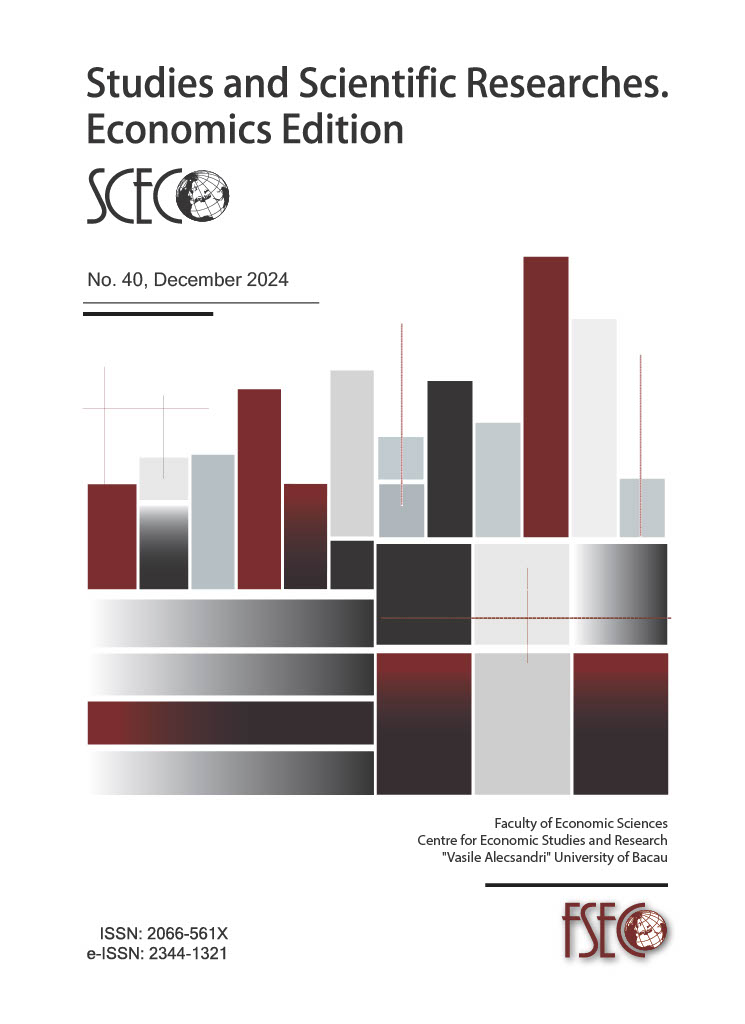The Voice of Employers – their Suggestions for Optimizing the Relationship between the University and the Labor Market
DOI:
https://doi.org/10.29358/sceco.v0i40.597Keywords:
skills, labor market, employers, university, solutionsAbstract
The university and the labour market can no longer be considered as separate entities because they are deeply interconnected, and their relationship is characterised by mutual influence. In order to ensure this relationship is functional and beneficial for all parties involved, it is highly important not only to listen to employers’ voice (which is the initial step) but also to incorporate their feedback into institutional development strategies. Effective communication and collaboration between universities and the labour market must be continuously fostered to guarantee that graduates acquire the skills employers expect and that employers are satisfied with the training provided. This study aims to identify a set of effective solutions proposed by employers to enhance the quality of graduates’ skills. In order to answer four research questions, data were collected and processed from a broader survey, conducted via a questionnaire with 153 employers from “Vasile Alecsandri” University of Bacău (UBc) between July and September 2024. The gathered data were then compared and correlated with findings from a similar study conducted in the previous year, during the same months. The results obtained will help the substantiation of decision-making and action lines at the faculty and institutional levels aimed at improving graduates’ skills in response to the dynamic and challenging demands of the labour market.
Downloads
References
ADR-NE (2023). Research and Innovation Strategy for Smart Specialization of the North-East Region, 3rd edition (RIS3 North-East), https://www.adrnordest.ro/en/what-we-offer/smart-specialization/
Broadley, T., Cai, Y., Firth, M., Hunt, E., & Neugebauer, J. (2023). The SAGE handbook of graduate employability, vols. 1-10. SAGE Publications Ltd, https://doi.org/10.4135/ 9781529791082
Brown, P., Hesketh, A., & Williams, S. (2023). Employability in a knowledge-driven economy. Journal of Education and Work, 16(2), 107–126, https://doi.org/10.1080/13639080305562
Cojocariu, V.M., Furdu I.M., & Tomozei C.I. (2017). Reliable Distributed Software Platform for Optimizing the Convergence between the University System and the Labour Market, in Proceedings of the 11th International Technology, Education and Development Conference, (INTED 2017); 6-8 March 2017, Valencia, Spain, 843-852
Cojocariu , V.M., Nechita, E., Mareş, G., & Mâţă, L. (2024). Connecting Academia and Business on the Quadruple Helix. Employers’ Support to Optimize Training in Higher Education, The Future of Higher Education – Bologna Process Researchers’ Conference (FOHE-BPRC5), Bucharest, 25 – 26 March 2024
European Commission (2011). Directorate-General for Employment, Social Affairs and Inclusion, An Agenda for new skills and jobs – A European contribution towards full employment: communication from the commission to the European parliament, the council, the European economic and social committee and the committee of the regions, Publications Office, 2011, https://data.europa.eu/doi/10.2767/28479
Eurostat (2022). Statistics explained. Employment rates – annual statistics, https://ec.europa.eu/eurostat/statistics-explained/SEPDF/cache/49184.pdf
Faier, S. (2024). Job market in 2024 in comparison to 2023, https://www.wall-street.ro/articol/Careers/311256/cum-se-prezinta-piata-muncii-in-2024-in-comparatie-cu-2023.html
Ferrández-Berrueco, R., Sánchez-Tarazaga, L. & Humpl, S. (2021). The interest of companies in participating in Higher Education. In Chisvert-Tarazona, M.J., Moso-Diez, M., & Marhuenda-Fluixá, F. (Eds.) Apprenticeship in dual and non-dual systems. Between tradition and innovation. Peter Lang International Academic Publishers.
Harvey, L. (2000). New Realities: the Relationship between Higher Education and Employment, Tertiary Education and Management, 6, 3–17, Kluwer Academic Publishers, Netherlands. https://qualityresearchinternational.com/esecttools/relatedpubs/New%20Realities.pdf
HolonIQ (2024). 2024 Global Education Outlook, https://www.holoniq.com/notes/2024-global-education-outlook?ref=newsletters.holoniq.com
Huseth, A. (2023) Collaboration in Higher Education: How Can Universities Partner with Employers? Archer Education, https://www.archeredu.com/hemj/collaboration-in-higher-education-univerisities-partner-with-employers/
Kellevezir, I. & Çakır, Ö. (2020). Hearing the Voice of the Sector and Graduates and Transferring into the Curriculum. Eurasian Journal of Educational Research, 20, 1-20
Lauder, H. & Mayhew, K. (2020). Higher education and the labour market: an introduction, Oxford Review of Education, 46(1), 1-9, https://www.tandfonline.com/doi/full/10.1080/ 03054985.2019.1699714
Naveed, A. (2023). 12 Strategies to Improve the Quality of Higher Education, https://pk.linkedin.com/in/dr-naveed-ahmed-4142a756
NCUB (2021). The National Centre for Universities and Business: Collaboration for Future Skills. Bridging higher education and industry to meet the skills needs of tomorrow, https://www.ncub.co.uk/wp-content/uploads/2021/07/Collaboration-for-Future-Skills-Report.pdf
Quacquarelli Symonds (2022). What do employers want from today’s graduates? Insights from the 2022 QS Global Employer Survey, https://insights.qs.com/hubfs/Reports/
Reilly, P. (2021). Collaborating with employers to create work-ready graduates, Times Higher Education, https://www.timeshighereducation.com/campus/collaborating-employers-create-workready-graduates
Scheuring, F., & Thompson, J. (2024). Enhancing graduate employability – exploring the influence of experiential simulation learning on life skill development. Studies in Higher Education, 1–15, https://doi.org/10.1080/03075079.2024.2334837
Weingarten, H.P. (2021). Improving the Linkages between University and Work Policy and Practice Recommendations, Public Policy Forum, Ottawa, Canada, https://ppforum.ca/wp-content/uploads/2021/06/ImprovingTheLinkagesBetweenUniversityAndWork-PPF-June2021-EN.pdf
XXX (2023). Universities improving graduate employment. Case studies, Universities UK, https://www.universitiesuk.ac.uk/sites/default/files/field/downloads/2023-11/unis-improving-graduate-employment-case-studies.pdf
XXX (2024). Global Labor Market Trends in 2024, https://www.eresrelocation.fr/en/ labor-market-trends/
Downloads
Published
Issue
Section
License
Copyright (c) 2024 Venera-Mihaela Cojocariu, Marcela-Cornelia Danu, Elena Nechita, Cristina Cîrtiță-Buzoianu, Gabriel Mareș

This work is licensed under a Creative Commons Attribution 4.0 International License.
Authors who publish with Studies and Scientific Researches. Economics Edition (SCECO) agree to the following terms:
-
Copyright Retention
Authors retain full copyright over their work and grant the journal the right of first publication. The published article is simultaneously licensed under the Creative Commons Attribution 4.0 International License (CC BY 4.0). This license permits others to:-
Share — copy and redistribute the material in any medium or format
-
Adapt — remix, transform, and build upon the material
for any purpose, even commercially, as long as proper attribution is given to the original author(s) and source.
-
-
Additional Distribution
Authors may enter into separate, non-exclusive contractual arrangements for the distribution of the journal’s published version of the work (e.g., post it to an institutional repository, include it in a book), with clear credit to the initial publication in SCECO. -
Preprint and Open Posting Policy
Authors are encouraged to post their work online (e.g., in preprint archives, institutional repositories, or personal websites) before submission, during review, and after publication.
This practice supports academic exchange and can lead to earlier and broader dissemination and citation of published work.
(See: “The Effect of Open Access” – PLOS)
For further inquiries regarding copyright, licensing, or archiving, please contact the editorial office at Editorial Board








